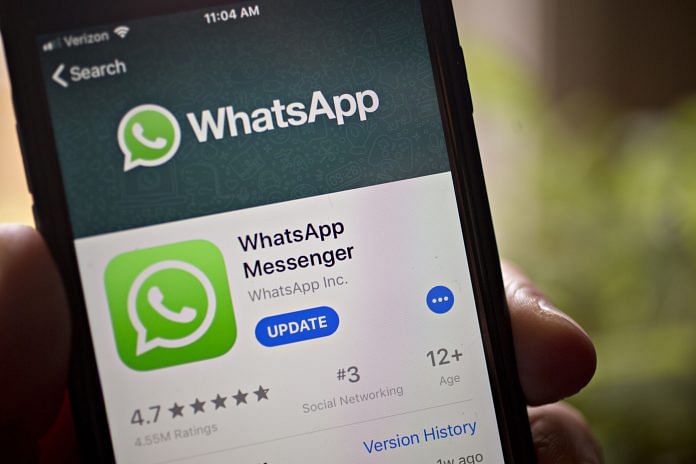New Delhi: WhatsApp has filed a case against the central government in the Delhi High Court over the new IT rules for social media intermediaries that the company says breaches users’ privacy protections.
A source in the know told ThePrint, “The IT rules published earlier this year, in addition to calling for ‘traceability’, risk criminal penalties for non-compliance. We felt we had no choice other than to seek the opinion of the honorable courts.”
According to the rules published on 25 February, social media firms will be required to “enable the identification of the first originator of the information on its computer resource” if sought by law.
In the case of WhatsApp, this means the end-to-end encryption that guarantees privacy of messages from all parties, except the sender and receiver, will have to be broken.
The source said WhatsApp is trying to counter the attempts to break end-to-end encryption, which would enable traceability in other countries as well. In Brazil, the Facebook-owned messaging app is fighting a similar case in the Supreme Court.
The IT ministry’s new rules, called the ‘Information Technology (Intermediary Guidelines and Digital Media Ethics Code) Rules, 2021’ specifically target messaging apps such as WhatsApp that are considered ‘significant’ social media intermediaries.
A significant social media intermediary is a firm with at least 50 lakh registered users in India. The government says WhatsApp has 53 crore users in India.
The deadline for compliance with the new rules ended Tuesday after a three-month period.
In an email response to ThePrint, a WhatsApp spokesperson said the new rules undermine privacy. “Requiring messaging apps to ‘trace’ chats is the equivalent of asking us to keep a fingerprint of every single message sent on WhatsApp, which would break end-to-end encryption and fundamentally undermines people’s right to privacy.”
The spokesperson further said the company has “consistently” joined civil society and experts around the world in “opposing requirements that would violate the privacy of our users”.
“In the meantime, we will also continue to engage with the Government of India on practical solutions aimed at keeping people safe, including responding to valid legal requests for the information available to us,” the statement added.
ThePrint reached the IT secretary via WhatsApp message for a comment, but didn’t receive a response till the time of publishing this report.
Also read: Relax, you can still post on Facebook, Youtube & tweet. Modi govt isn’t shutting them down
‘Many oppose govt’s rule’
When the traceability concept was first proposed in early 2019, “dozens of organizations” had written to the government about how it would violate the Indian user privacy, the source quoted above said.
The source added that not everyone working with the government agrees with the push to enable traceability, noting that “other parts of the Indian government” have “taken issue”. “Legal advisors to the government argued the traceability requirement in the draft rules are not supported by Indian laws,” the source said.
WhatsApp had published an FAQ about the issue of traceability, in which it says: “Traceability forces private companies to turn over the names of people who shared something even if they did not create it, shared it out of concern, or sent it to check its accuracy. Through such an approach, innocent people could get caught up in investigations, or even go to jail, for sharing content that later becomes problematic in the eyes of a government, even if they did not mean any harm by sharing it in the first place.”
The WhatsApp FAQ adds, “The threat that anything someone writes can be traced back to them takes away people’s privacy and would have a chilling effect on what people say even in private settings, violating universally recognized principles of free expression and human rights.”
WhatsApp’s latest run-in with the Indian government comes just months after WhatsApp’s troubles with implementing its new privacy policy.
The government in January had asked WhatsApp to withdraw the changes to its policy after it caused a furore among users who raised concerns about data privacy.
Only last week, the Centre told the Delhi High Court that it views the new privacy policy a violation of the IT law and rules.
(Edited by Manasa Mohan)
Also read: What Twitter, Facebook & social media firms could stand to lose if they miss IT Rules deadline



